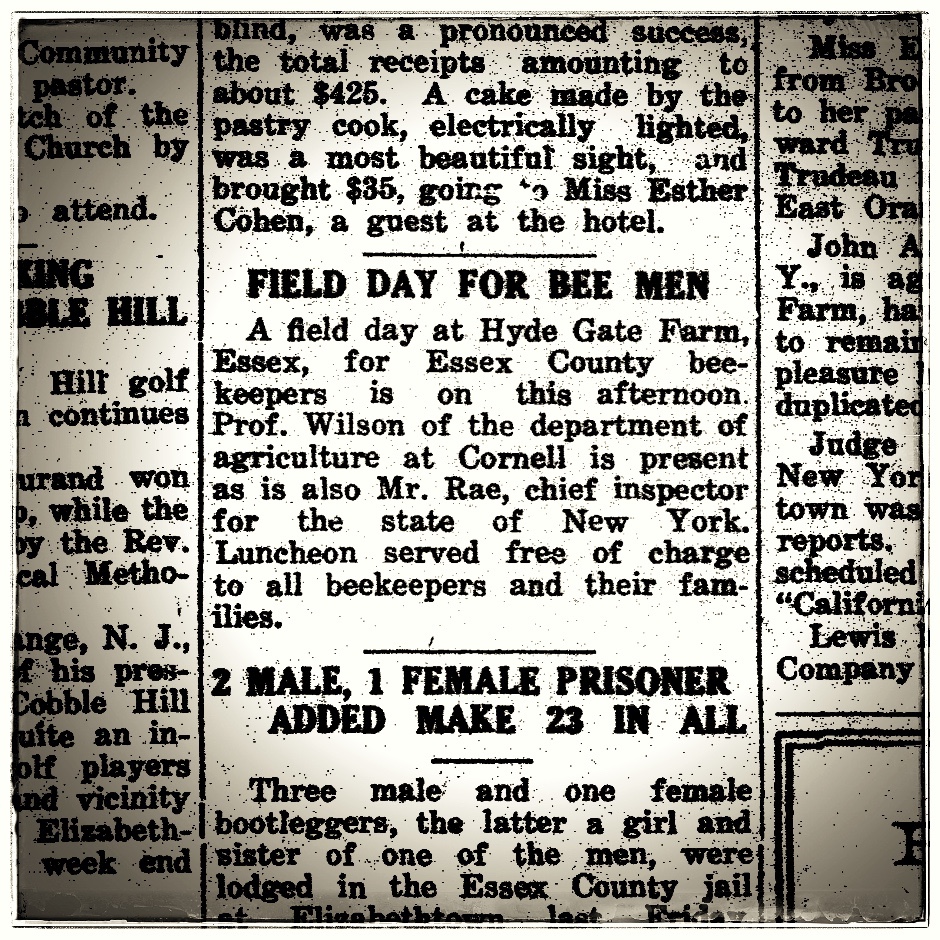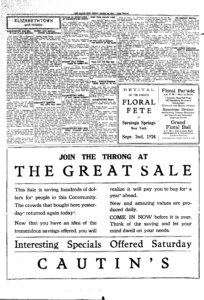
Almost 100 years ago Rosslyn (a.k.a. Hyde Gate Farm) hosted a beekeeper rendezvous. Or, to be more precise Professor Wilson, from Cornell’s Dept. of Agriculture, and Mr. Rae, New York State’s “chief inspector” (of apiaries?), hosted a gathering of beekeepers at Rosslyn.
Now & Then
Although any Rosslyn artifact piques my interest, this news clip served as a reminder that
- I’ve intended to learn the art and science of beekeeping and honey production for quite some time,
- I supported a crowdfunding campaign for Flow Hives 5-6 years ago (or even longer ago?!?!),
- I received my beehive and related apparatus from Flow Hive almost as long ago, and
- I’ve neglected this goal for a long time. Too long!
Ever since I began planting Rosslyn’s orchard I started daydreaming about bees pollinating our fruit trees and rendering delicious honey in the process. But, “a dream without a plan is just a wish”, right? And today we are still reliant on nature’s own supply of honeybees, butterflies, hummingbirds, etc. to ensure the fertilization of our apples, pears, stone fruit, mulberries, and persimmon. If only I could teleport back to August 29, 1924 and learn the ropes from this probably well experienced cohort. So often I feel this history distorting nostalgia for knowledge buried in Rosslyn’s long line of yesterdays. And as often I’ve recognized the unlikely chance of time travel and settled for a patchwork quilt of now-and-thens.
Beekeeper Rendezvous 1924
Contemporary contextualizing aside, there are a couple of intriguing tidbits that I can’t resist the temptation to explore before letting this sepia snippet from an ooold newspaper fall back into the kindling box.
Let’s look at the full classified notice.
FIELD DAY FOR BEE MEN
A field day at Hyde Gate Farm, Essex, for Essex County beekeepers is on this afternoon. Prof. Wilson of the department of agriculture at Cornell is present as is also Mr. Rae, chief inspector for the state of New York. Luncheon served free of charge to all beekeepers and their families. (Lake Placid News, August 29, 1924, page 12)
The title alone is evocative. It conjures a cinematographic scene with gentlemen farmers and at least a couple of officious types gathering in the high grass somewhere west of Rosslyn’s carriage barn. At the time there would have been several barns — the present day carriage barn with a lean-to barn running along the southern facade, a smaller barn conjoined to the west facade, a freestanding barn southwest of the carriage barn, the present day icehouse, and a dovecote (i.e. dovehouse / pigeon house) located just east of the icehouse — so a panoramic view of the gents huddling around hives in a sun soaked meadow would have required a slightly circuitous amble to the north or south of the barns, perhaps through the gardens where the beekeepers’ families were conversing in twos and threes while sipping lemonade, eagerly awaiting the complementary luncheon… Can you see it?
You’ll note that I’ve specified men learning in earnest, listening to a presenter gesticulating toward the hives, everyone acting relaxed but secretly a little edgy about the number of been coming and going in the increasingly hot mid-day temperature. Men and not women. Not children. I’m taking a leap, but it seems to be likely, especially given the linguistic tilt of the title which invites “bee men” in particular rather than beekeepers as referenced in the first sentence of the listing. Perhaps I reach too far. It’s compelling to envision a couple of female beekeepers among the gentlemen farmers, poised and confident month the buzzing swarm.
Also intriguing is the reference to Hyde Gate Farm. I’m familiar with the years that Rosslyn was known as Hyde Gate House, but this little shift in nomenclature intrigues me.
A family named Walmsley of New Orleans, La. then became owners and later Mrs. Caleb J. Coatsworth bought the house. (about 1907 or 1908) When Mrs. Coatsworth died, her daughter, Mrs. Howard Hill, fell heir to the property.(1912) During ownership of the Hill family the place was named Hyde Gate House.
In 1937 Essex county assumed ownership, but sold to Richard R. Williams in 1941. Mr. Williams in turn, sold Hyde Gate House to Sloane E. Miller in 1942, who disposed of the property in 1945 to Mr. and Mrs. W. Sherwood, the present owners and occupants. (Source: Favored by Fortune: Sherwood Inn Flashback)
So it would seem that starting with Mrs. C.J. Coatsworth or Mrs. Howard Hill the property became known as Hyde Gate House and Hyde Gate Farm. I admit finding a certain pleasure in recognizing Rosslyn’s agricultural DNA since the property is mostly associated with its mercantile forbears and later it’s incarnation as The Sherwood Inn. I like to think of the +/-60 acres that we’ve been fortunate enough to gradually aggregate as a farm once again, Rosslyn Farms.
But I’m off on a self indulgent tangent, so I’d best return to the newspaper.
The reference to Cornell also draws my attention as it highlights the extensive history that today’s Cornell Cooperative Extension has invested in this region. And I’ll close this peripatetic post with two final editorial asides.
First, I draw your attention to the subtle enticement (free food for the whole family!) luring beekeepers away from their chores and homes. A tried and true formula that reminds me of a memory shared by a friend. During his college years a rock-and-roll band went by the peculiar name, Free Beer, and their performances emblazoned across bulletin boards across campus never failed to draw a capacity crowd.
My final aside may simply highlight a technicality, but it nevertheless brought a curious eyebrow lift when I read it. The listing suggests that the event is happening on the day that the paper was printed. In order for the notice to be of use, newspapers would need to be purchased and read first thing in the morning. Perhaps this is one of several successive notices. Or perhaps the promo team dropped the ball and waited to the last minute (ergo free lunch!). Most intriguing of all is the real time relevance of the newspaper for people living a long time prior to our 24×7 information age where messaging is virtually instantaneous and the plugged in population might occasionally dismiss prior generations as being a little disconnected, etc. Far from it. Read the paper over breakfast, change up the days plans, pack the family into your Model T, and head over to Hyde Gate Farm for a beekeeping field day and luncheon!

Leave a Reply